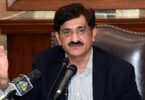F.P. Report
ISLAMABAD: As the Supreme Court resumed hearing on a set of intra-court appeals against the revocation of the National Accountability Bureau (NAB) law amendments on Thursday, Chief Justice of Pakistan Qazi Faez Isa remarked that apparently, former prime minister Imran Khan’s government also only wanted accountability of politicians.
CJP Isa was heading the five-judge bench which also included Justice Aminuddin Khan, Justice Jamal Khan Mandokhail, Justice Athar Minallah and Justice Hasan Azhar Rizvi. Imran Khan, the incarcerated founder of the Pakistan Tehreek-e-Insaf (PTI), joined the proceedings via video link from Rawalpindi’s Adiala Jail. His request seeking personal appearance in the case is still pending with the apex court.
After Thursday’s hearing which also included PTI founder Imran Khan’s viewpoint on the matter which he shared through a video link from Adiala Jail, the court reserved the verdict.
Appearing before the bench, lawyer Farooq H. Naik stated that he had prepared his written submissions. He said he was supporting the note of Justice Mansoor Ali Shah. At this, CJP Isa questioned whether he was adopting the arguments of Makhdoom Ali Khan, the former attorney general for Pakistan. Naik responded that the arguments were his own.
Khawaja Haris walked up to the rostrum and advanced his arguments as the court’s assistant. The chief justice asked Haris to tell the court which fundamental right had been affected by the NAB amendments. He said he had explained the violation of fundamental rights in detail in the main case, adding that NAB amendments were in violation of Articles 9, 14, 25, and 24 of the constitution.
Haris said the NAB law was promulgated in 1999 by retired Gen Pervez Musharraf and before him, there was a similar Accountability Act during the regime of Nawaz Sharif. At this point, the chief justice remarked that Pervez Musharraf had said that the purpose of the NAB was to remove corrupt politicians from the system, and the same was true of the request of the PTI founder.
The lawyer said the name of any politician was not written on that petition, on which the chief justice remarked that apparently, the government of the PTI founder also only wanted the accountability of politicians. The CJP further said the NAB law did not apply to the judiciary and certain institutions or personalities, but no amendment was made in this regard. “Parliament could have enacted the legislation.”
Khawaja Haris said all major political parties formed governments between 1999 and 2018, but no political party made such amendments to NAB rules. At this, the CJP noted that other political groups were not party [in the case], as the amendments were challenged by the PTI. “We will ask them [about it].”
Lawyer Haris argued that these NAB amendments were challenged with specific reference. He said corruption affected the fundamental rights of the people, adding that embezzlement of public funds was a violation of fundamental rights.







